Ever wonder why a cake recipe says to use cocoa powder, but then says not to use dutch processed cocoa powder? Well there’s a good reason for that, so let’s answer the question, “Which cocoa powder do I use and why?”
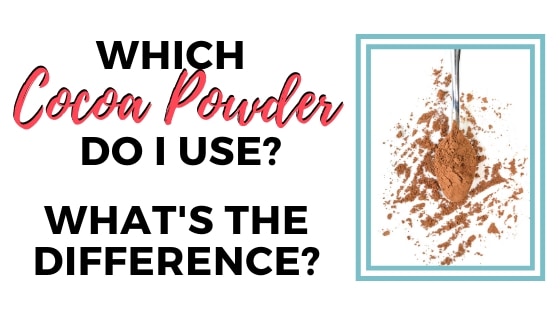
So here’s the short answer for the question, “Why does a recipe say not to use dutch cocoa powder?” It’s because regular natural cocoa powder and dutch processed cocoa powder are not the same thing and they’re not interchangeable.
One is acidic and one isn’t and that makes a difference when it reacts with the other ingredients in your cake batter.
Different types of cocoa powders are used for different reasons, but for this post, we’ll be talking specifically about using cocoa powder for baking cakes.
First let’s take a step back and talk about the basics.
As an Amazon Associate, I earn from qualifying purchases.
WHAT IS COCOA POWDER?:
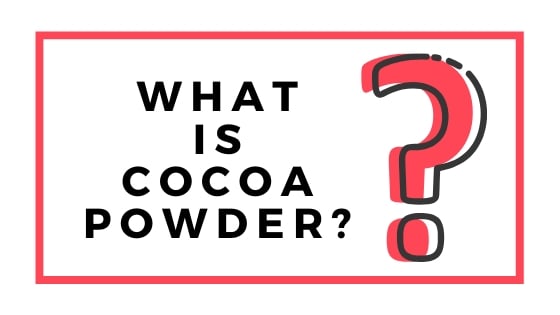
First let’s talk about what it’s NOT. Cocoa powder is not hot cocoa mix. That’s a drink mix. What we’re talking about here is actually unsweetened cocoa powder that’s found on the baking aisle at the grocery store.
When I was a kid, I found some in our pantry and got a big ol’ spoonful of it to eat thinking it was hot cocoa mix. Boy was I surprised. You can’t eat it on it’s own…it’s unsweetened and very strong.
So here’s what cocoa powder really is: Cocoa powder is actually an ‘end product’. It’s essentially the ground up remains of the cocoa bean after cocoa butter has been extracted. It’s a really concentrated form of chocolate.
WHY USE COCOA POWDER IN CAKES INSTEAD OF MELTED CHOCOLATE?:
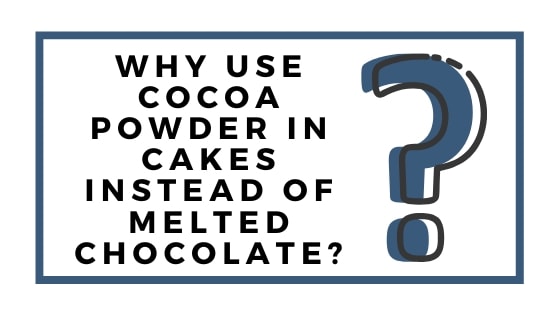
Cocoa powder is concentrated and you get way more chocolate flavor in an ounce of cocoa powder than in an ounce of melted chocolate.
That’s why it’s used so much in cake baking. It’s easier to get a more intense chocolate flavor using cocoa powder rather than melted chocolate.
WHAT ARE THE DIFFERENT TYPES OF COCOA POWDER?:
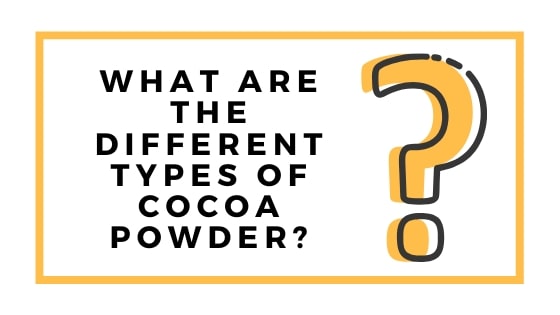
For the most part, there are two different types of cocoa powder: Natural Cocoa Powder and Dutch Processed Cocoa Powder
Natural Cocoa Powder is what most recipes call for. This is the ground up cocoa beans after cocoa butter has been extracted.
Dutch Processed Cocoa Powder is essentially just one more step. You see, chocolate is naturally acidic and the dutch process actually alkalizes it. That means the cocoa powder is treated with an acid neutralizer, so it renders the cocoa powder non acidic. That mellows the flavor and makes it deeper.
Bakers have their favorite types of cocoa powder to use, but really it’s all about what you prefer…and what the recipe calls for, which is super important.
WHICH COCOA POWDER DO I USE?:
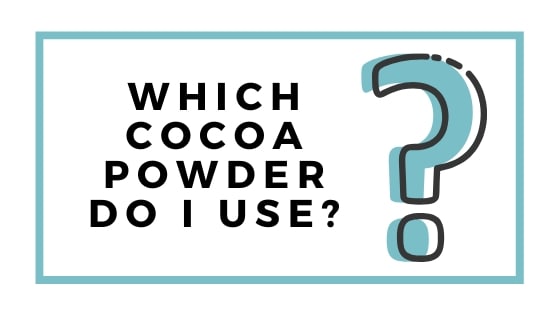
Short answer is always use the one the recipe calls for because the recipe developer has held into account the other ingredients and how they’ll interact with the type of cocoa powder called for in the recipe.
It’s really important not to substitute here. Natural cocoa powder and dutch cocoa powder aren’t interchangeable without some other changes to the recipe.
WHY DOES A RECIPE CALL FOR NATURAL COCOA POWDER AND SAYS NOT TO USE DUTCH PROCESSED?:
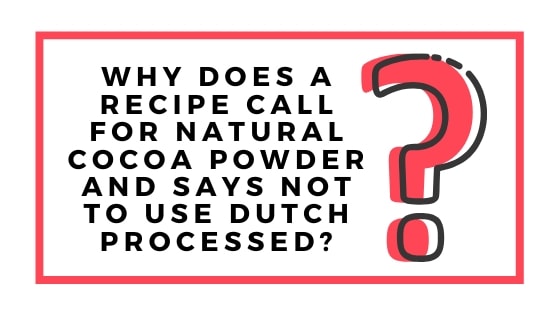
Ok, let’s get sciency here: Many recipes call for natural cocoa powder and then will say ‘not dutch processed’ cocoa powder. The reason is that the natural cocoa powder is acidic and the dutch processed has the acids processed out of it.
The reason that’s important and why they tell you not to substitute Dutch processed in place of regular cocoa powder, is that generally baking soda is added to a cake recipe to offset any ingredients that are acidic (which in this case, would be the regular cocoa powder).
So if you used dutch processed cocoa powder instead, then the baking soda isn’t offsetting anything.
So, baking soda is used in cake recipes when there is an acid in the cake ingredients. Otherwise you would use baking powder. (Ok, that’s not set in stone, but it’s generally the case.) If you use baking soda and there are no acidic ingredients in the cake batter, then the cake can have a weird taste to it and sometimes the texture could be off…you just can’t predict how it’ll turn out.
If you used dutch cocoa powder instead of natural cocoa powder, then you might have to replace the baking soda with another leavening agent like baking powder…that would just depend on the other ingredients in the recipe though.
You may not be able to just cut out the baking soda without adding in some baking powder and expect the cake to still rise. You also don’t want to cut out the baking soda and replace it with the same amount of baking powder. Those two things aren’t the same and baking powder isn’t as strong as baking soda. But the other ingredients in the cake play a factor in how much you’ll need to add, if any.
As you can see, it can get complicated when substituting ingredients. Baking isn’t like cooking. The ratios work together so intricately that one thing can throw it off and the cake won’t rise, or it’s just really dense with weird rubbery streaks in it.
Basically it’s much easier and predictable to just use the natural cocoa powder if that’s what the recipe calls for otherwise you could get an unintended result.
So, one more note: If a recipe doesn’t call for any leavening, like baking powder or baking soda, then you can ‘probably’ use either type of cocoa powder, since it won’t be interacting with a leavening agent. (But that would not likely be a cake. It would more likely be some type of bar or brownie recipe.)
Well I hope this cleared some things up. If not, and it’s still a bit confusing, feel free to leave me a comment and I’ll do my best to help!
OTHER POSTS YOU MIGHT LIKE:
- What’s the difference between baking soda and baking powder when baking cakes? (coming soon)
- Types of Flour for Baking Cakes
- How to Properly Measure Ingredients for Baking Cakes
Don’t forget to pin it below!

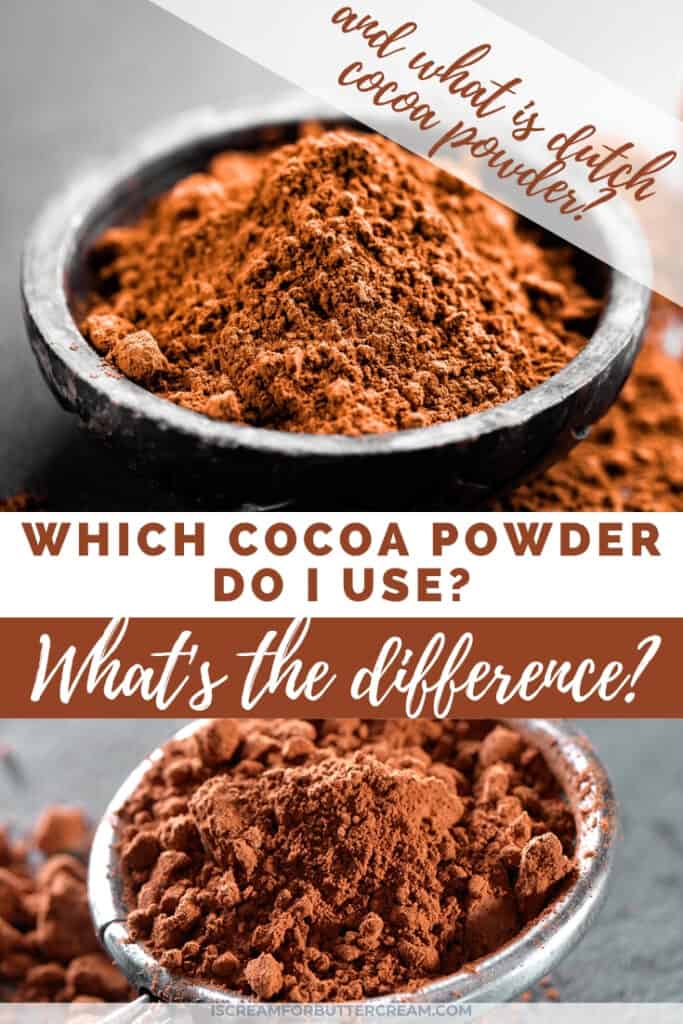
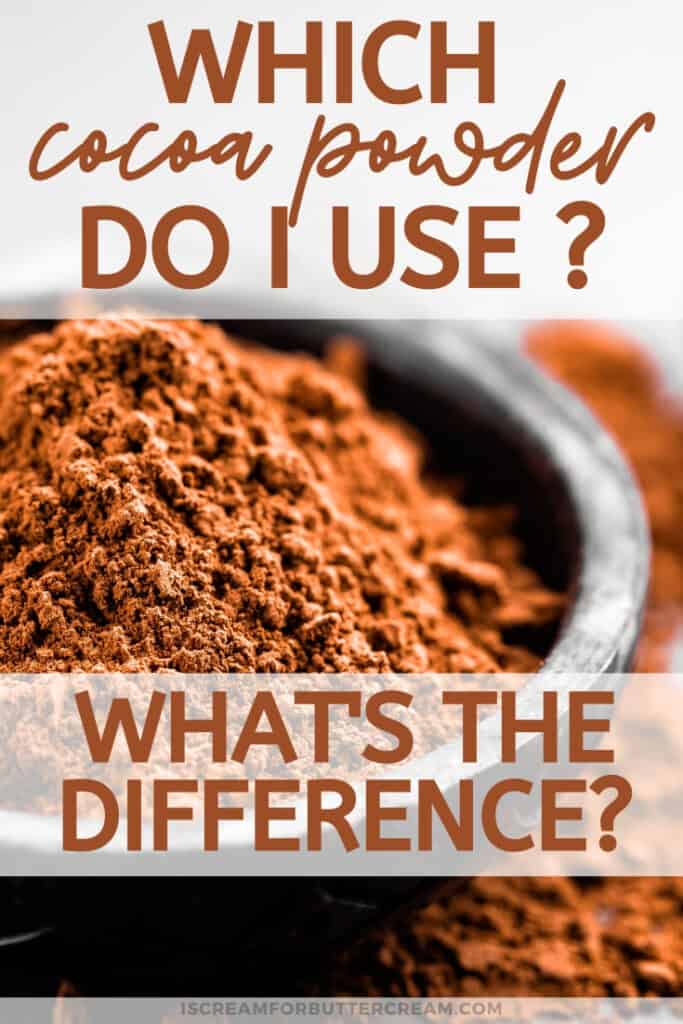
jesus ramiro quispe onofre
Ola Kara Jane es un gusto saludarte, bendiciones. Estábamos trabajando con cocoa en polvo en unos muffin de chocolate y nos salia bien y lo cambiamos a cocoa en polvo con alcalina el producto final no es el mismo.
Creo es que estamos usando de una forma equivocada. Gracias por explicarnos el método con cocoa alcalino y sin ello. No sabes cuanto te agradezco. bye.
Kara Jane
Estoy usando google para traducir, así que espero que esto tenga sentido. ¡Estoy tan contento de que la publicación del blog haya ayudado! Sí, usar el polvo de cacao alcalino realmente podría cambiar el producto final. ¡Espero que hayas podido ajustar la receta y que haya funcionado! Y muchas gracias por comentar! 🙂
Arleen
Every week I make one of your cakes. This week it’s the marble cake. It did not disappoint! I used the vanilla bean frosting, not the chocolate because I used the chocolate last week. These cake recipes are just delicious. I never alter your recipes, yet I notice some do. I think they are perfect! I love cake just like you so thank you again!
Kara Jane
Arleen, that is the best compliment! Thank you so much and I’m so glad that you like the recipes. You’ve just made my heart happy. ?
Grace
Thanks a lot for sharing ❤️